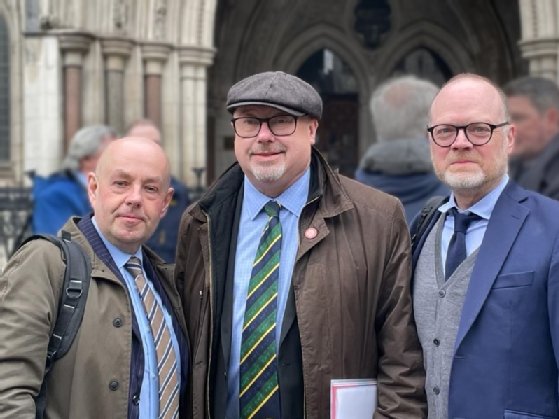
Mat Hayward - stock.adobe.com
NI Policing Board pressed to open inquiry into PSNI spying on journalists’ phones
Amnesty International and the Committee on the Administration of Justice have asked Northern Ireland’s policing watchdog to open an inquiry into the Police Service of Northern Ireland’s use of surveillance powers against journalists
The policing watchdog in Northern Ireland has been asked to set up an inquiry into allegations that police have covertly monitored journalists’ phones.
Amnesty International and the Committee on the Administration of Justice (CAJ) have written to the Policing Board asking for a statutory inquiry into the Police Service of Northern Ireland’s (PSNI) use of surveillance powers against journalists.
The request follows claims in the Investigatory Powers Tribunal (IPT) in London that the PSNI arrested two journalists, Trevor Birney and Barry McCaffrey, as part of a covert surveillance and “disruption” operation which attempted to identify their confidential sources.
Evidence disclosed in the tribunal last week revealed that McCaffrey was subject to phone surveillance in his capacity as a journalist in 2011, 2013 and 2018. Court documents also revealed that the PSNI subjected a well-known journalist from a separate media organisation to similar surveillance.
Durham Police and the PSNI unlawfully arrested Birney and McCaffrey, and seized computer equipment, notebooks and terabytes of data in 2018. The raids were in response to the journalists’ role in producing a documentary film, No stone unturned, which exposed police failures to investigate the murders of six innocent people in a pub in Loughinisland, County Down, by a paramilitary group. The PSNI later apologised and paid compensation to the two journalists.
A year later, Birney and McCaffrey asked the tribunal to investigate whether they had been subject to unlawful surveillance by the PSNI, GCHQ, MI5 and MI6.
Evidence disclosed to the tribunal last week, following a series of secret hearings, revealed that three police forces had monitored McCaffrey’s phone data between 2011 and 2018.

Serious concerns
The letter, seen by Computer Weekly, was sent by Patrick Corrigan from Amnesty International and Daniel Holder from the CAJ. It calls on the Policing Board to use its statutory powers to carry out a formal inquiry into surveillance by the PSNI on journalists, lawyers and other human rights defenders.
“Our organisations continue to share serious concerns about how widespread the practice of the use of covert surveillance powers against journalists and others may have been,” it says.
“As you will appreciate, the IPT will be limited to the particular circumstances of the specific case before it, rather than the question of wider PSNI practices in this area.
“Despite these limitations, this case has already revealed that such surveillance has been deployed against multiple journalists on multiple occasions under multiple chief constables – a pattern of potential unlawful activity and a breach of the European Convention of Human Rights.
“We repeat our request to the Board to conduct an inquiry, under the powers vested in you under the Police (Northern Ireland) Act 2000, into PSNI use of surveillance powers against journalists, lawyers and other human rights defenders,” it continues.
“Given this, we are writing to again press for action from the Policing Board. Failing that, we wish to enquire how the Board plans to fulfil its role effectively ensuring PSNI human rights compliance with respect to this matter, which not only has the potential to undermine public confidence in policing, but also in policing oversight mechanisms.”
Surveillance was unlawful
The PSNI accepted in the Investigatory Powers Tribunal that its 2013 surveillance operation targeting McCaffrey was unlawful. The High Court in Belfast also found that the 2018 raid on Birney and McCaffrey’s homes and offices was unlawful.
The National Union of Journalists, which is backing the call for an inquiry, has urged other Northern Ireland journalists who suspect they may have been targeted for covert surveillance by the police to lodge complaints with the Investigatory Powers Tribunal.
The organisation said it fears the pattern of covert and intrusive surveillance by the police against journalists, and potentially others such as lawyers and activists, goes much further than the incidents revealed so far.
The Policing Board is expected to discuss the matter a meeting today
Read more about Trevor Birney and Barry McCaffrey
- Britain’s most secret court is to hear claims that UK authorities unlawfully targeted two journalists in a ‘covert surveillance’ operation after they exposed the failure of police in Northern Ireland to investigate paramilitary killings.
- The Police Service of Northern Ireland is unable to delete terabytes of unlawfully seized data taken from journalists who exposed police failings in the investigation of the Loughinisland sectarian murders.
- The Investigatory Powers Tribunal has agreed to investigate complaints by Northern Ireland investigative journalists Trevor Birney and Barry McCaffrey that they were unlawfully placed under surveillance.
- Three police forces took part in surveillance operations between 2011 and 2018 to identify sources that leaked information to journalists Trevor Birney and Barry McCaffrey, the Investigatory Powers Tribunal hears.
Read more on Identity and access management products
-
![]()
PSNI chief sorry over failure to delete data unlawfully seized from journalists
-
![]()
Northern Ireland police kept inspectors in dark over surveillance of journalists
-
![]()
Investigatory Powers Tribunal has no power to award costs against PSNI over evidence failures
-
![]()
Met Police spied on BBC journalists’ phone data for PSNI, MPs told






